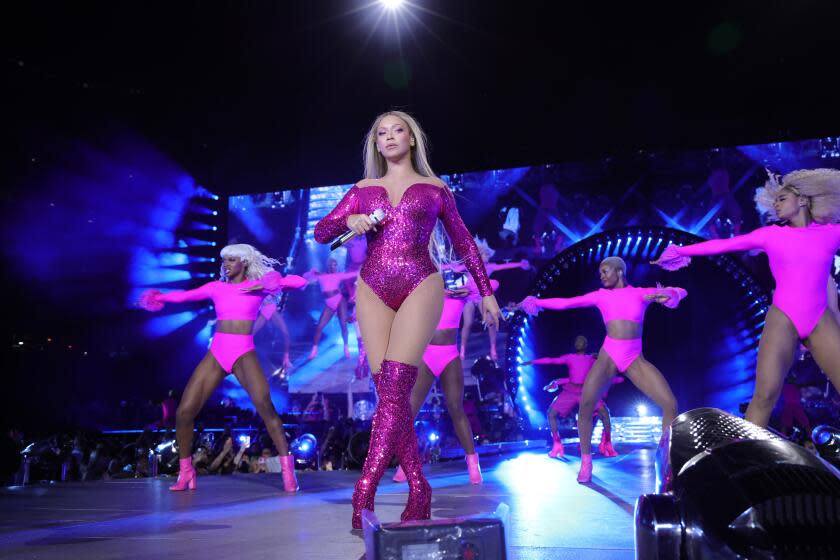Granderson: We have the tools to stop the spread of HIV. So why haven't we?

- Oops!Something went wrong.Please try again later.
Uncle Johnny made my dress
That cheap Spandex, she looks a mess.
Beyoncé’s Grammy-winning album elevated Uncle Johnny’s name in the song “Heated” in 2022, but her mother, Tina Knowles, had been talking about him publicly for years.
The dress Beyoncé is referring to was the one Johnny made for her prom. He designed and made a number of others for her and her sister Solange throughout their childhoods. Knowles credits him with being both their de facto nanny and her definitive rock.
He died from complications of AIDS in the early 1990s. Knowles still gets quite emotional talking about him. That was the case at a conference earlier this month as she reflected on his life while encouraging members of the National Assn. of Black Journalists to cover more stories about HIV.
Because tragedies like what happened to Beyoncé’s uncle aren’t just history. They’re current events.
In 2021, women represented nearly 20% of new HIV infections. More than 50% of women who contracted the virus were Black. President Biden’s 2024 budget proposed $237 million for a federal PrEP program — that’s pre-exposure prophylaxis, a daily pill intended to keep HIV-negative people from becoming HIV-positive.
Read more: Granderson: Biden's job now is to remind voters how well he's done his job
The issue is that just 11% of Black people who could benefit from PrEP were prescribed it, the Centers for Disease Control and Prevention estimated in 2021. That number is nearly 80% for their white counterparts. It’s 20% for Latinos.
Part of the racial disparity has to do with resources, something that I hope the new budget will address.
But stigma and shame remain major obstacles.
Read more: Granderson: How hip-hop helped me through grief
Which is why Knowles told those journalists recently that she doesn’t mind shedding a few tears if her story could help save lives. Black and brown people are contracting HIV and dying of AIDS at a disproportionate rate. Knowles said that her family wasn’t able to get Johnny the proper care in time to save his life — and care was pretty spotty in the early ’90s regardless. Today we are blessed to live at a time when HIV can be a chronic, managed disease rather than a death sentence.
Read more: Column: College football's in chaos. It'll still be fun to watch
Last month, the World Health Organization echoed earlier CDC findings, stating: “People living with HIV who have an undetectable viral load … and continue taking medication as prescribed have zero risk of transmitting HIV to their sexual partner(s).”
There is medication to safeguard against contracting. Medication to prevent spreading. But there isn’t a prescription for destigmatizing.
Or apathy. It feels as if because Magic Johnson is thriving, the virus isn’t a threat. And it isn’t the danger it once was. But the homophobia that greeted Johnson after he revealed he was HIV-positive is still very much an epidemic.
Read more: Granderson: Montgomery racial brawl video shows it's not enough to be 'not racist'
This month alone there have been two national stories about people killed because of homophobia: Laura Ann Carleton and O’Shae Sibley. One for hanging a Pride flag at her business, the other for dancing to Beyoncé.
Because of the effect the virus had on the LGBTQ+ community in the beginning, there remains a homophobic discomfort for some to talk about HIV. Sometimes it’s a Bible scripture that is used to discourage helping a family member or justify harming strangers at the ballot box. That’s a recurring theme in our punitive society. That kind of cruel mind-set can even act invisibly, discouraging the people who need help the most from seeking it.
After her 2022 album "Renaissance" came out, Beyoncé made it known that her latest release was one way of honoring Uncle Johnny. The family using their platform to encourage others to get tested, to seek treatment, to go on living — that's another.
“We never treated him badly,” Knowles said of Johnny at the conference. “Everyone was super protective of him.
“He got sick and … when we lost him … it was one of the most painful experiences for all of us. The hard thing was before he passed away, his friends started passing away. … They weren’t getting the medical attention they needed.”
Read more: Granderson: Why 'school choice' was doomed when it became a cover for segregation
She referenced “Dallas Buyers Club,” the 2013 film based loosely on Ron Woodroof, a Texas man who contracted the virus in the early days and challenged the federal government on drug distribution and treatment. Matthew McConaughey won an Oscar for his portrayal of Woodroof, who said he lost all of his friends once they learned of his status.
Back then we didn’t know nearly as much as we do today.
Today we have all the tools we need to end the spread of HIV.
So why are we still dying?
This story originally appeared in Los Angeles Times.

